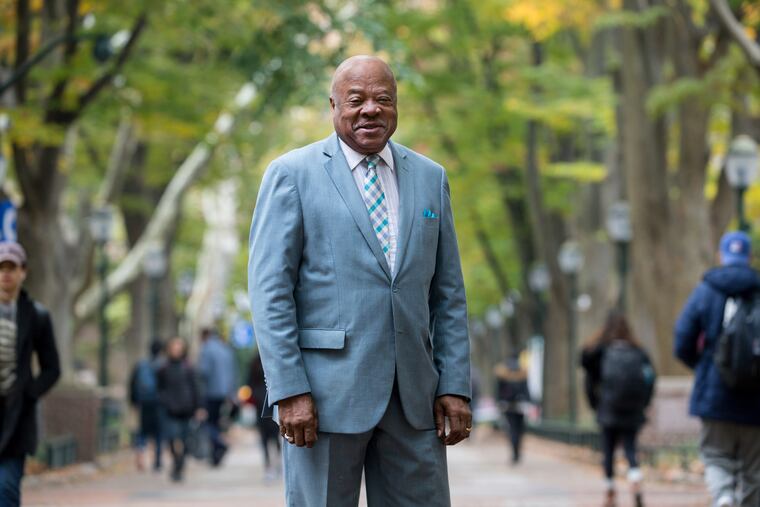Let’s help a Penn professor get the U.S. to declare racism a public health crisis
Walter Palmer doesn’t just want to call racism a public health crisis — he wants the country to do something about it.

I thought a lot about the legacy of slavery this past Juneteenth.
It didn’t get in the way of my enjoying the day, which President Joe Biden last year declared a federal holiday, but it hung over everything I did like an ominous cloud.
Since this year’s commemoration fell on a Sunday, Monday was the actual day off for many federal and local workers, including me. That gave me plenty of time to read and digest a front-page piece written by Inquirer colleague Sarah Gantz about how Black women are four times more likely to die from their pregnancies than white women, and have greater odds of substandard pain management.
This is a familiar trend. According to health data, African Americans have poorer health outcomes than whites, and tend to “live sicker and die quicker.” Just look at what happened during COVID-19, when African Americans suffered from considerably higher rates of infection and death than white people.
This shouldn’t be a surprise. We live in a racist society, and the stress of that takes its toll on the body and psyche. And when problems arise, Black people have the additional burden of navigating health-care systems rife with implicit bias, where some providers may believe racial stereotypes that African Americans don’t feel pain as acutely, or are less intelligent and less likely to be compliant, for instance.
University of Pennsylvania professor Walter Palmer has launched a campaign to get the United States to declare racism a national public health crisis, which could force us to put more resources behind its eradication. So far, he has collected about 4,000 signatures on a Change.org petition.
He’s trying to attract Philadelphia influencers to help make the movement go viral. “It’s going to take folks like Questlove and Kevin Hart and Will Smith to say, ‘Hey, I read this. I support this and put it on their Facebook and put it on their TikToks and their Instagram [accounts], etc.,” Palmer told me.
There is precedent for this, he said. “America did the Marshall Plan after the second World War and rebuilt Germany. They did the same thing in Japan and rebuilt Japan. ... So now it’s a case of charity beginning at home.”
Palmer’s proposal is not a new idea. But it’s an idea whose time has come.
» READ MORE: A Marshall Plan for Black America is the only way to repay this country’s moral debt | Opinion
In recent years, various states and municipalities around the United States have taken steps to formally declare racism a public health crisis.
Rep. Ayanna Pressley (D., Mass.), along with Rep. Barbara Lee (D., Calif.) and Sen. Elizabeth Warren (D., Mass.), last year reintroduced the Anti-Racism in Public Health Act, which would not only declare structural racism a public health crisis but also create a center for anti-racism at the Centers for Disease Control and Prevention. As part of that, there would be a program designed to prevent law enforcement violence.
“Structural racism is a public health crisis that continues to ravage Black, brown, and indigenous communities, deny us access to quality health care, and exacerbate the longstanding racial disparities in health outcomes,” Pressley said in a statement. “To confront and dismantle the racist systems and practices that create these inequities, we need robust, comprehensive research on the public health impacts of structural racism and policy solutions to bring an end to these disparities once and for all.”
Closer to home, Palmer first presented his idea for a petition during a grand rounds presentation in 2020 at the University of Pennsylvania medical school. He intends to dedicate his movement to the late George Floyd, an unarmed Black man killed by a police officer two years ago, and anyone else who has died from racialized acts.
“Every time there’s a killing, we put flowers on a pole or on a lot or on a street corner. They have a court battle, it gets settled. It gets done. We go back to sleep and then the next killing or shooting or hanging or suicide. ... This just has to come to an end,” he told me last week. “They don’t make the connection [that] these kids’ self-hatred is tied to hundreds of years of informed trauma. It’s generational trauma.”
Palmer, 87, has been advocating for national dialogue on the topic for 70 years, starting back in 1955 when he founded the Black People’s University of Philadelphia, one of the first Black freedom schools. It’s been only recently that major health organizations such as the American Medical Association and American Public Health Association have supported the idea.
“This is the next movement to bring racism to an end,” he said.
Palmer doesn’t just want to call racism a public health crisis — he wants the country to do something about it. “Just making a declaration is not enough. What’s the action?”
Palmer, who teaches a course on American racism at Penn, said his aim is to reach one million signatures on his Change.org petition by 2025, when he turns 90.
It’s a noble goal.
I promised I’d help him spread the word.